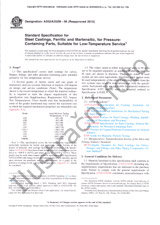Potřebujeme váš souhlas k využití jednotlivých dat, aby se vám mimo jiné mohly ukazovat informace týkající se vašich zájmů. Souhlas udělíte kliknutím na tlačítko „OK“.
ASTM D3154-14(2023)
Standard Test Method for Average Velocity in a Duct (Pitot Tube Method)
Přeložit název
NORMA vydána dne 1.1.2023
Informace o normě:
Označení normy: ASTM D3154-14(2023)
Datum vydání normy: 1.1.2023
Kód zboží: NS-1102496
Počet stran: 12
Přibližná hmotnost: 36 g (0.08 liber)
Země: Americká technická norma
Kategorie: Technické normy ASTM
Kategorie - podobné normy:
Anotace textu normy ASTM D3154-14(2023) :
Keywords:
stack gas velocity, pitot traverse, pitot tube, Staubscheibe pitot tube, Type S pitot tube, Orsat, Orsat analyzer, Method 1, Method 2, Method 3, Method 4, stack gas moisture, stack gas molecular weight, stack gas density ,, ICS Number Code 17.120.20 (Flow in open channels)
Doplňující informace
| Significance and Use | ||||||||||||||||||||
|
5.1?The procedures presented in this test method are available, in part, in Test Methods D3685/D3685M, as well as the ASME Methods (PTC 19.10-1968, PTC 19.10-1981, and PTC 38-1980) given in 2.3 and Footnote 5,1.1?This test method describes measurement of the average velocity of a gas stream for the purpose of determining gas flow in a stack, duct, or flue. Although technically complex, it is generally considered the most accurate and often the only practical test method for taking velocity measurements. 1.2?This test method is suitable for measuring gas velocities above 3 m/s (10 ft/s). 1.3?This test method provides procedures for determining stack gas composition and moisture content. 1.4?The values stated in SI units are to be regarded as standard. The inch-pound units given in parentheses are for information only. 1.5?This test method is applicable to conditions where steady-state flow occurs, and for constant fluid conditions, where the direction of flow is normal to the face tube opening of the pitot tube employed in the method. The method cannot be used for direct measurement when cyclonic or swirling flow conditions are present. 1.6?This standard does not purport to address all of the safety concerns, if any, associated with its use. It is the responsibility of the user of this standard to establish appropriate safety, health, and environmental practices and determine the applicability of regulatory limitations prior to use. 1.7?This international standard was developed in accordance with internationally recognized principles on standardization established in the Decision on Principles for the Development of International Standards, Guides and Recommendations issued by the World Trade Organization Technical Barriers to Trade (TBT) Committee. |
||||||||||||||||||||
| 2. Referenced Documents | ||||||||||||||||||||
|
Doporučujeme:
Aktualizace technických norem
Chcete mít jistotu, že používáte pouze platné technické normy?
Nabízíme Vám řešení, které Vám zajistí měsíční přehled o aktuálnosti norem, které používáte.
Chcete vědět více informací? Podívejte se na tuto stránku.




 Cookies
Cookies
